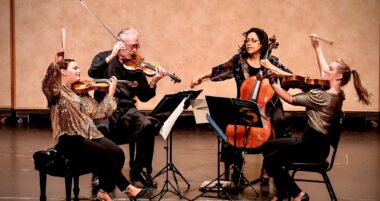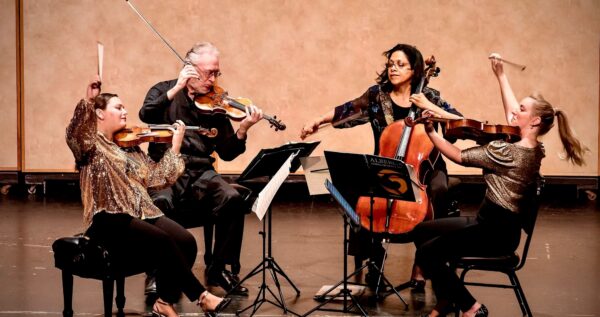 United Kingdom Schubert, Beethoven and Widmann: Juilliard String Quartet – Areta Zhulla (violin), Ronald Copes (violin), Molly Carr (viola) Astrid Schween (cello). Wigmore Hall, London. 19.1.2025 and 20.1.2025 (CSa)
United Kingdom Schubert, Beethoven and Widmann: Juilliard String Quartet – Areta Zhulla (violin), Ronald Copes (violin), Molly Carr (viola) Astrid Schween (cello). Wigmore Hall, London. 19.1.2025 and 20.1.2025 (CSa)

19.1.2025
Schubert – String Quartet in G D887
20.1.2025
Beethoven – String Quartet No.13 in B-flat Op.130
Jörg Widmann – String Quartet No.8 ‘Beethoven-Study III’
Barely one week after the Moscow-based Borodin Quartet celebrated their 80th anniversary playing Brahms and Tchaikovsky at London’s Queen Elizabeth Hall (review here), the Juilliard String Quartet, founded in New York City by Juilliard School president William Schuman and violinist Robert Mann 79 years ago, could be heard in two cleverly connected recitals at Wigmore Hall playing Schubert, Beethoven and Jörg Widmann. Both ensembles are amongst the most famous in the world, and in technique and interpretative skills both are extraordinary. Yet they come from very different cultural backgrounds and bring distinct and contrasting qualities to their performances. Some would argue that the Borodins, steeped in the Russian tradition, produce a darker and more soulful tone than their U.S. cousins whose playing has strikingly bright New World modernity. Whereas the Russians display little extraneous physicality and achieve their remarkable cohesiveness without any visible interaction, the Americans bring somatic energy and visual communication.
Sunday morning’s Wigmore coffee concert featured one work. Franz Schubert’s epic last String Quartet in G. Composed in 1826 in the final years of his life, the Juilliard presented an intense, explosive, yet magnificently controlled account of the turbulent opening Allegro. From the anguished cries and fretful disquiet of the introductory passages to moments of sweet calm and shimmering pizzicatos as the movement developed, the phrasing, tempos and balance were all perfectly judged, and the players alert to every mood and shift of light. The Juilliard gave the second movement Andante con moto, a sinister, desolate, almost dreamlike quality, in which the searingly beautiful and delicate cello theme (an outstanding contribution here by Astrid Schween) was hounded by menacing growls and quivering tremolos from the remaining strings. A quicksilver meticulously executed Scherzo was followed by a surging, impulsive tarantella Finale, in which, for over 10 minutes, these supremely accomplished players continued to unsettle, dazzle and enthral.
Dominating the Juilliard’s Monday Lunchtime concert was Beethoven’s late, great String Quartet in B-flat Op.130. Their programme choice was not by chance. At almost the same time as Schubert, battling his last illness, was completing his G minor quartet, Beethoven, shortly before his own death, finished and performed his String Quartet in B-flat Op.130. There were other connections too, between these two great works. Both feature stark and dramatic contrasts, and both share a spiritual kinship, exploring extremes of emotion, lyrical beauty and dramatic tension. As the American musicologist Timothy Judd points out, these two late works ‘offer a glimpse of profound revelation’ But while Schubert’s work ‘can be less goal-oriented and more open-ended’ Beethoven ‘takes us on a dramatic journey with an ultimate sense of resolution’.
The journey taken by the Juilliard was made the lighter without the 15-minute Grosse Fuga or ‘Great Fugue’ finale, described by Simon Brackenborough in his programme note as a ‘contrapuntal juggernaut that scarcely pauses for breath’. They chose instead the finale Allegro which Beethoven at his friends’ behest had written to replace it. From first to last, their performance was characterised by superb articulation, fine balance, and rich instrumental playing. There was edge-of-the-seat drama too. After the first few pensive bars of the introductory Adagio the jagged, disjointed rhythms of the Allegro positively leapt from the strings, followed by a propulsively driven yet gossamer light Presto. The succeeding Andante was warm and tender, and the Alla danza tedesca all grace and charm. A serene, expansive and deeply moving account of the Cavatina made way for the substituted and wonderfully expressive finale.
The recital ended with a specially commissioned work from the renowned German composer Jörg Widmann, whose admiration for Beethoven is well known. His three movement String Quartet No.8 ‘Beethoven-Study III’ explores and examines Beethoven’s revolutionary approach to string quartet form. Intended as an homage but also as reinterpretation of Beethoven’s ideas, ‘Study III’ refracts the old Master’s unpredictable rhythms, dissonances and lyricism through a contemporary lens, particularly the Alla danza tedesca from Op.130. The result – fragmented, unpredictable, emotionally complex and tension-filled – is a startlingly fresh and often witty reinterpretation. All these qualities and more were captured by the Julliard players who succeeded in creating a dialogue across the centuries with extraordinary virtuosic skill.
Chris Sallon
